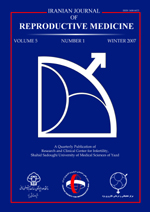
|
International Journal of Reproductive BioMedicine
Research and Clinical Center for Infertility, Shahid Sadoughi University of Medical Sciences of Yazd
ISSN: 1680-6433
EISSN: 1680-6433
Vol. 15, No. 5, 2017, pp. 297-304
|
 Bioline Code: rm17040
Bioline Code: rm17040
Full paper language: English
Document type: Research Article
Document available free of charge
|
|
|
International Journal of Reproductive BioMedicine, Vol. 15, No. 5, 2017, pp. 297-304
| en |
Frequency of chromosomal aneuploidy in high quality embryos from young couples using preimplantation genetic screening
Fesahat, Farzaneh; Montazeri, Fatemeh; Sheikhha, Mohammad Hasan; Saeedi, Hojjatollah; Firouzabadi, Razieh Dehghani & Kalantar, Seyed Mehdi
Abstract
Background: Selection of the best embryo for transfer is very important in assisted
reproductive technology (ART). Using morphological assessment for this selection
demonstrated that the correlation between embryo morphology and implantation
potential is relatively weak. On the other hand, aneuploidy is a key genetic factor
that can influence human reproductive success in ART.
Objective: The aim of this lab trial study was to evaluate the incidence of
aneuploidies in five chromosomes in the morphologically high-quality embryos
from young patients undergoing ART for sex selection.
Materials and Methods: A total of 97 high quality embryos from 23 women at the
age of 37or younger years that had previously undergone preimplantation genetic
screening for sex selection were included in this study. After washing, the slides of
blastomeres from embryos of patients were reanalyzed by fluorescence in-situ
hybridization for chromosomes 13, 18 and 21.
Results: There was a significant rate of aneuploidy determination in the embryos
using preimplantation genetic screening for both sex and three evaluated autosomal
chromosomes compared to preimplantation genetic screening for only sex
chromosomes (62.9% vs. 24.7%, p=0.000). The most frequent detected
chromosomal aneuploidy was trisomy or monosomy of chromosome 13.
Conclusion: There is considerable numbers of chromosomal abnormalities in
embryos generated in vitro which cause in vitro fertilization failure and it seems that
morphological characterization of embryos is not a suitable method for choosing the
embryos without these abnormalities.
Keywords
Preimplantation genetic screening; Aneuploidy; Sex chromosome; Autosomal chromosome.
|
| |
© Copyright 2017 - International Journal of Reproductive Medicine
Alternative site location: http://www.ijrm.ir
|
|
